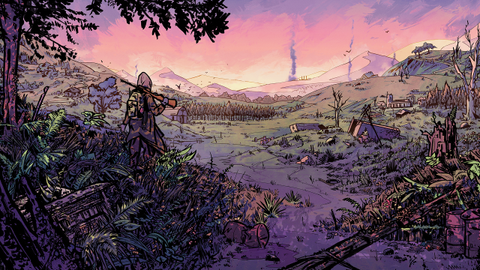Our Verdict
A tense and taxing but wonderfully engaging hybrid of singleplayer roguelike and extraction shooter.
PC Gamer's got your back
What is it? A very deadly hybrid of extraction shooter and singleplayer roguelike.
Release date October 24, 2024
Expect to pay $20/£17
Developer CABO Studio
Publisher Modern Wolf
Reviewed on NVIDIA GeForce 4070 Ti, 32GB RAM
Steam Deck Playable
Link Official site
Have you ever considered what would’ve happened to Bill Murray’s character in Groundhog Day if he hadn’t got out of that time loop? If he’d just stayed living the same day over, and over, and over, with no happy ending?
That’s a little like what CABO Studio’s debut title, ZERO Sievert, can feel like—at least at first. An extraction shooter from a top-down perspective with similar graphical fidelity to the original Grand Theft Auto, it mashes up Escape From Tarkov-esque runs with a roguelike structure. You emerge from your bunker and head out to find supplies, grab weapons, and complete quests, before desperately trying to make it home alive. It's one of those combos that seems completely obvious in retrospect, and CABO certainly finds success with it.
ZERO Sievert is taut, tense, and taxing. Though it's not multiplayer like most extraction shooters, its enemies feel almost as deadly as other players. As I end my latest run with a bullet between my potato-like character’s eyes at two in the morning, I should be swearing at the screen and throwing up my hands. As it is, I’m exhaling and puffing out my cheeks—in some ways, death is a relief in a world this brutal.
The game's simple facade feels deliberately disarming. Looking at it, you’d be forgiven for thinking it’s all a little rote—you run about, strafe around bad guys, and ‘pew pew’ like it’s Power Pete from the shareware days.
With those unassuming looks, how hard could it be? That false sense of security was knocked out of me within minutes on my first run, as I moved too quickly, alerted a wild boar to my location, and was quickly gored to death. No hardened mercenary, no devious trap, just a disgruntled pig.
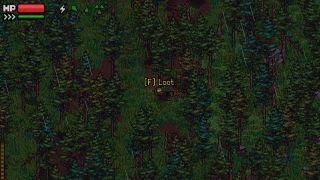
That humbling helped me appreciate more of what ZERO Sievert is about, though. Death is a teaching tool—every mistake you make has consequences, but they're opportunities for betterment. Though that positive perspective doesn't make me feel any less terrified when I'm sneaking between trees and buildings, listening out for the telltale sound of an enemy up ahead.
In one run I snuck up on one bandit and eliminated him, only for another trio of bad guys to turn and chase me away, calling me names as I fled with my tail between my legs. Foes will follow as best they can, meaning the initial sprint of fleeing the scene needs to become hushed footsteps as you sneak to hide behind a tree or rock.
In that example, I certainly wish I’d spent some money on a sniper rifle with a scope back at the game’s safe zone, so I could have scouted the area more thoroughly and maybe even picked an enemy or two off without others knowing. Equipment plays a huge role in ZERO Sievert, helping you tailor your playstyle, whether you're trying to sneak more effectively, put down more hurt at close range, or, indeed, snipe from a distance.
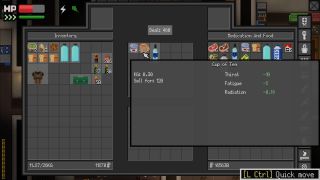
Skills allow for further customisation, letting you earn increased XP from quests, sprint for longer, or benefit from improved aiming while moving. These can be earned by finding skill books out in the world, but they're also sold back at the bunker, making it easy to switch up your playstyle.
It all contributes to making ZERO Sievert a much deeper experience than it may appear on the surface. There's a real attention to detail throughout, and the more you learn the game's nuances, the better your odds of survival grow—an incremental process of improvement that makes even the smallest win feel like an accomplishment.
Just extracting successfully is its own victory, even if all you've Tetris'd into your inventory is some extra ammo and some random junk—and you soon find yourself ready for another go. In fact, despite being an extraction shooter, one of the most enjoyable parts of ZERO Sievert is getting in.
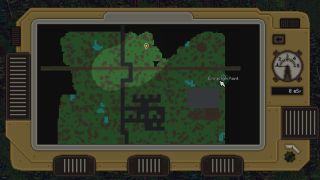
That’s because each time you head back out, the world is newly procedurally generated. Maps aren’t huge, but strike a perfect balance of being manageable yet packed with possibilities.
With a fresh environment every time, a key moment of each run is checking your map once you hop off of the train that drops you into the level, and using pins to mark points of interest and the extraction point. It's welcome variety for a formula that could otherwise grow stale. But it does also causes arguably the biggest issue with the roguelike formula here—the awkwardness of finding quest items.
Many of the game’s NPCs have quests that require killing a certain enemy type or grabbing a series of items, and that can be tricky when they’re constantly respawning in new locations. For example if you're looking for a propane tank, in one run it might be found near the arrival point, while the next it could be on the opposite end of the map. It’s a relatively minor problem, but an annoying one—on your latest of half a dozen attempts to find the one item or enemy type that's eluded you, you certainly feel the frustration.
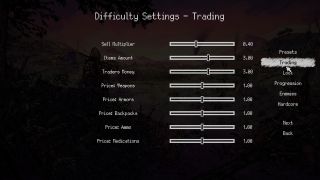
It does help, though, that you're given exhaustive options to tweak the overall experience to your liking, when you find yourself wishing it was more forgiving (or harder, if you're a masochist). Each time you start a new game you can adjust an impressive amount of sliders for everything from the decay rate caused by the in-game hunger system, to the permadeath mechanics, to even more granular details such as how much money traders have and what they'll pay for your items.
Switching these in your favour is a neat way to ease yourself in, but there are also presets for easier, hard, and very hard difficulties, too. It makes it feel like there’s always a pull to jump in for just one more run whatever your mood—whether you're looking for a new challenge, or just want the satisfaction of quickly snatching up some junk and making an easy profit at the vendors.
The simple visuals make ZERO Sievert an ideal Steam Deck candidate, and the good news is that despite its humble ‘Playable’ rating, it runs really well. The only issue I had is that inventory management is, naturally, easier with a mouse. More than once I fumbled with shifting items from a corpse to my inventory only to be gunned down by another enemy while I was trying to fit a packet of cigarettes into my backpack. I suspect with a little remapping, though, the Steam Deck (and other handheld PC options) could become an excellent way to play the game.
If you’re looking for an extraction shooter that takes the hassle of PvP out of the equation and boils the subgenre down to its barest essentials, ZERO Sievert is well worth a look. Every bit as tense as Tarkov, it’s a very promising debut from a new studio that has me planning additional runs even as I finish typing this review.
A tense and taxing but wonderfully engaging hybrid of singleplayer roguelike and extraction shooter.
